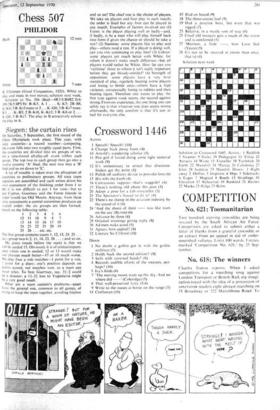Chess 507
PHILIDOR
B. Ellerman (Good Companions, 1921) White to play and mate in two moves; solution next week.
Solution to No. 506 (Beal-4R3/8/134B2/3k4/ 1P6 2K5/4P3/13): B-K5. A 1 . . . K-K5; 2B-B8, K-K6; 3 B-Kt3 mate or 2 ... K-Q4; 3 B-Kt7 mate. B I . K-B3; 2 B-Kt8, K-Kt3; 3 R-K6 or 2 ... K-Q4; 3 B-Kt7. The play in 13 attractively echoes the play in A.
Siegen: the curtain rises
On Saturday, 5 September, the first round of the Chess Olympiads took place. This year, with sixty countries—a record number—competing, the event falls into two roughly equal parts. First, the countries are divided into six groups of ten, for a nine-round all-play-all event within each group. The top two in each group then go into a twelve country 'A' final, the next two into a 'B' final and so on down to 'E'.
A lot of trouble is taken over the allocation of countries to preliminary groups. All sixty team captains are assembled and each writes down his own ncsessment of the finishing order from 1 to 60; it is not difficult to put 1 for ussa—but to put Cyprus, Guernsey and the Faroe Islands in order would tax Old Moore. Anyway, from these sixty assessments a central committee produces an overall order: the six groups are then formed, based on the following table:
1 2 3 4 5 6 12 II 10 9 8 7 13 14 15 16 17 18 24 23 22 21 20 19 25 26 ... etc. etc.
The first group contains teams 1, 12, 13, 24. 25 ...
etc.; group two is 2, 11, 14, 23, 26 ; and so on.
My euess (made before the start) is that we will be seeded 15. Obviously it is of critical import- ance where one is seeded; 12 or 13 would make our chances much better-17 or 18 much worse. We play four a side matches-1 point for a win, point for a draw: one's position depends on points scored, not matches won, so a team can never relax. To beat Guernsey, say. 3H- could be a disaster: a 14-21 loss to Yugoslavia might be a very good result.
What are a team captain's problems—apart from the general one, common to all games, of trying to keep the team together. avoiding friction and so on? The chief one is the choice of players. We take six players and four play in each match; the order is fixed but any four can be played in any match. Examples of factors involved are (1) Form: is the player playing well or badly—and, if badly, is he a man who will play himself back into form if given the chance or should he take a rest? (2) Stamina: some players like to play and play—others need a rest. If a player is doing well, can you risk continuing to play him? (3) Colour: some players are much better with White, for others it doesn't make much difference—but all players would rather be White. How far can you 'victimise' those to whom it isn't really important before they get bloody-minded? (4) Strength of opposition: some players have a very level standard of play, regularly beating worse players and losing to better ones—others have a high variance, unexpectedly losing to rabbits and then beating tigers. Therefore one wants to play the first type against weak teams, the second against strong. From my experience, the one thing one can safely say is that whatever one does seems wrong afterwards; the only comfort is that it's just as bad for everyone else.














































 Previous page
Previous page